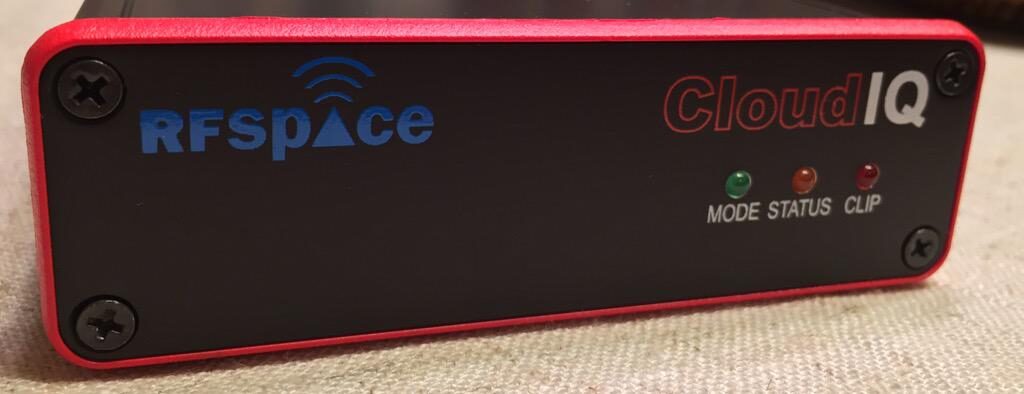The RFspace CloudIQ is a high performance, direct sampling software radio with an ethernet interface. It offers outstanding low distortion, low noise and low spurious characteristics. The CloudIQ radio was developed for both direct streaming of I/Q data to the PC, as well as, remote radio monitoring anywhere in the world. It performs spectrum analysis, demodulation, and streaming to a computer.
The CloudIQ features a direct sampled 9kHz to 56 MHz RF port. It includes a two input antenna switch that can be remotely selected. One input can be used for VHF and one for HF. The RF port has builtin variable attenuation, preselection and surge protection. The CloudIQ is designed to be connected directly to antennas without the need of external amplifiers or extra filtering. The CloudIQ handles all of the streaming via ethernet. It offers an I/Q streaming mode where the radio sends 24 bit I/Q pairs to the PC for processing. This I/Q mode offers one of the cleanest and highest dynamic range baseband signals that we have seen in any commercial receiver. The I/Q balance, DC spur, IMD and phase noise performance is superb. This mode of operation has a very high ethernet bandwidth utilization which limits the use to direct to PC connections.
In addition to the I/Q streaming mode, the CloudIQ has a low bandwidth, cloud mode for internet operation. In this mode, the radio will capture spectrum data as well as demodulate the signals of interest. The radio has built in demodulators for AM, SAM, LSB, USB, WFN, FM, CW, ASK, OOK, and PSK31. The radio will compress the demodulated waveform using the high performance and phase continuous G726 and G711 codecs. The raw 64 kbit/s stream can also be selected if that is preferred.
The CloudIQ’s cloud mode also offers a variable width spectrum analyzer with adjustable spans up to 10 MHz wide. The spectrum update rate can be adjusted up to 10 Hz or turned off to limit the bandwidth utilization. In addition, the builtin squelch can be used to limit data transmission when no signals are present.
Features:
Wideband spectrum analyzer mode offers 56 MHz wide spectral captures in both 2D, 3D and waterfall formats.
9kHz low end frequency range allows SONAR, VLF and ultrasound applications.
TCXO for best frequency stability.
The CloudIQ has an internal triggering mode for capturing repetitive signals. The internal trigger mode allows the phase to be adjusted, as well as the frequency in steps of 1nHz.
The builtin remote server allows the CloudIQ to be placed anywhere in the world. A PC running Windows, Linux, Android or MacOS is able to access the radio with very low latency. It does not
5/15/2015 CLOUDIQ RFspace CONNECTED SDR require a PC at the server side and the server is available within 10 seconds of boot up. An Android application has been developed to access the CloudIQ in cloud mode. In addition, an open source client is available license free for Windows, Linux and MacOS. Programming is extremely easy since all of the DSP, FFTs and scaling are done inside the radio.
Builtin RS232 connector for logging and control of REMOTE OPERATION
The RFSPACE CloudIQ is designed for streaming I/Q spectrum data to a PC or to be remotely located anywhere on the internet. The builtin remote server allows the CloudIQ to serve as a remote receiver node or receive gateway anywhere in the world. The fact that the CloudIQ does not require a computer, makes it highly reliable. During remote operation, the radio handles all of the demodulation, compression, directory listing, spectrum FFT processing and packetizing. The client application just sends the center frequency, demod mode and other settings and gets the formatted audio and spectrum packets. All of the DSP is handled server side. In order to make custom application development easy, RFSPACE supplies an open source and license free RemoteSDRClient application using the QT framework. It can be compiled for Windows, Mac OS and Linux. RFSPACE also supplies a compiled Android client that has been optimized for 3G and LTE connections.

